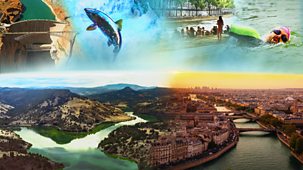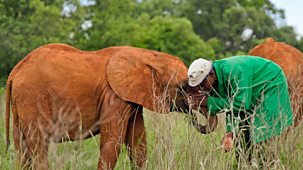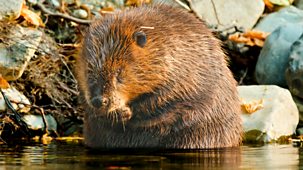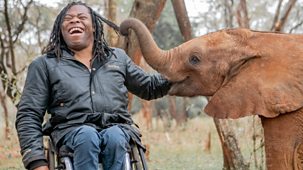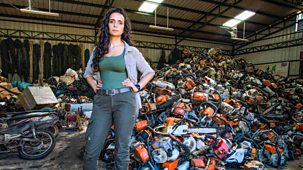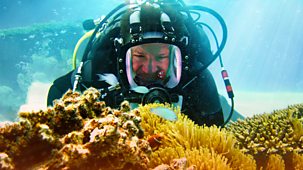
Restoring Our Reefs
As part of a seven-year project on threatened ecosystems, we take a special in-depth look in this third episode at one of the habitats under most urgent threat from climate change, coral reefs. What are the innovative techniques that could provide a much-needed lifeline and hope for the future?\n\nGlobally, coral reefs are at crisis point. Half of all coral reefs have already been lost or severely damaged, and experts predict that, without action, nearly all reefs could die off in the next 20 to 30 years. When the ocean is too warm for too long, corals bleach and die. 2023 saw record sea temperatures around the globe, and as bleaching events become more frequent, there's a race against time to find ways to help damaged reefs recover. \n\nSteve Backshall returns to the Maldives to take part in a world-first collaboration that could be the key to restoring reefs, not just here but around the globe. Professor Peter Harrison from Southern Cross University in Australia has spent over 40 years studying corals on the Great Barrier Reef. He’s devised a fertility treatment to help corals reproduce more successfully, known as ‘coral IVF’. Corals spawn on a few nights a year, releasing billions of eggs and sperm into the ocean. In the wild, spawn is at the mercy of currents and predators – only one in a million may make it to adulthood. Peter’s technique involves collecting the spawn and maximising fertilisation, allowing the larvae to develop in the safety of a net before releasing them onto areas of the reef that need restoration. Now, Peter is working with a scientist who may be able to enhance the success of this process by encouraging coral to grow where it is most needed. \n\nProfessor Steve Simpson and his team from Bristol University made the incredible discovery that coral larvae move towards the sound of a healthy reef and that the sounds of fish vocalisations trigger them to sink to the bottom, settle and grow. The scientists’ plan is to combine Peter’s fertility treatment to create thousands of baby coral with Steve Simpson’s fish recordings to lure them to set up home on a damaged reef. This method has never been tried before, but if it works, it could be a global game changer for reef restoration. The team collect the spawn at night and monitor its development, testing the larvae’s reactions to various sound recordings and finally releasing the microscopic baby corals onto desolate areas of reef to help it recover. \n\nIn the UK, Liz Bonnin investigates how coral is being cultivated on land and how new reefs are being built from scratch. Liz visits the Coral Spawning Lab in south London – an unassuming warehouse on an industrial estate that is playing a crucial part in coral conservation. Dr Jamie Craggs and his team have created a groundbreaking technique to grow corals on an industrial scale. They carefully control the temperature, light and water conditions to trick coral into spawning on demand and more often, with the aim of breeding millions of corals that can be planted out onto degraded reefs. Coral reefs are complex communities, and healthy corals rely on the interwoven relationships of all resident species. \n\nReplicating that in a lab is difficult, but Jamie’s colleague, Professor Mike Sweet, has made a breakthrough. He discovered that spawning baby sea urchins and corals together enhances their success dramatically. The baby urchins provide a vital service, grazing on algae that might otherwise grow over the tiny coral. Liz also heads to Cornwall where keen diver, Tom Birbeck, has set up a company that manufactures the building blocks of new reefs from waste material. Liz, Tom and the team sail out into Torbay to help build a brand new reef. As soon as the reef cubes hit the sea floor, curious fish and crustaceans check them out. There’s a growing demand for artificial reefs, and thousands of cubes could be used to protect offshore wind farms and their infrastructure. \n\nIn Florida, where 98 per cent of coral has been lost, Professor Andrew Baker at the University of Miami is designing hybrid reefs – a concrete structure covered in a living layer of coral. Tiny capsules containing a single coral larva and everything it needs to survive are printed onto a substrate that can be put onto the concrete foundation. Soon, these ready-made living reefs could be a sanctuary for marine creatures and protect coastal communities from extreme weather. \n\nThe problems that coral reefs face can seem insurmountable, but around the globe, scientists are working together to come up with novel and surprising techniques to give coral hope for the future.
Source: BBC 1
Most recent episodes of Our Changing Planet
Our Changing Planet
Restoring Our Reefs
As part of a seven-year project on threatened ecosystems, we take a special in-depth look in this third episode at one of the habitats under most urgent threat from climate chan ...
05-10-2025
BBC 1
Our Changing Planet
Restoring Our Rivers
Our Changing Planet is an ambitious natural history series examining the issues facing the earth’s most threatened ecosystems, and meeting the scientists and local conserv ...
02-05-2025
BBC 1
Our Changing Planet
Series 2: Episode 2
It’s year two of BBC’s ambitious, seven year project charting the fortunes of six of Earth’s most threatened ecosystems, and in the second episode we join thre ...
19-05-2023
BBC 1
Our Changing Planet
Series 2: Episode 1
The second year of the BBC’s ambitious, seven-year, natural history project sees six presenters visit six of the planet’s most threatened ecosystems to meet the peop ...
12-05-2023
BBC 1
Our Changing Planet
Series 1: Episode 2
In this second programme, another three presenters visit people fighting to rebalance vulnerable habitats around the world. \n\nLiz Bonnin travels to California to learn about t ...
02-06-2022
BBC 1
Our Changing Planet
Series 1: Episode 1
The launch of the BBC’s ambitious seven-year natural history project, in which six presenters visit six of the planet's most threatened ecosystems to meet the people fight ...
25-05-2022
BBC 1
Most popular episodes of Our Changing Planet
Our Changing Planet
Series 2: Episode 2
It’s year two of BBC’s ambitious, seven year project charting the fortunes of six of Earth’s most threatened ecosystems, and in the second episode we join thre ...
19-05-2023
BBC 1
Our Changing Planet
Series 1: Episode 1
The launch of the BBC’s ambitious seven-year natural history project, in which six presenters visit six of the planet's most threatened ecosystems to meet the people fight ...
25-05-2022
BBC 1
Our Changing Planet
Restoring Our Rivers
Our Changing Planet is an ambitious natural history series examining the issues facing the earth’s most threatened ecosystems, and meeting the scientists and local conserv ...
02-05-2025
BBC 1
Our Changing Planet
Series 1: Episode 2
In this second programme, another three presenters visit people fighting to rebalance vulnerable habitats around the world. \n\nLiz Bonnin travels to California to learn about t ...
02-06-2022
BBC 1
Our Changing Planet
Restoring Our Reefs
As part of a seven-year project on threatened ecosystems, we take a special in-depth look in this third episode at one of the habitats under most urgent threat from climate chan ...
05-10-2025
BBC 1
Our Changing Planet
Series 2: Episode 1
The second year of the BBC’s ambitious, seven-year, natural history project sees six presenters visit six of the planet’s most threatened ecosystems to meet the peop ...
12-05-2023
BBC 1


